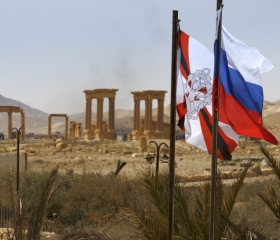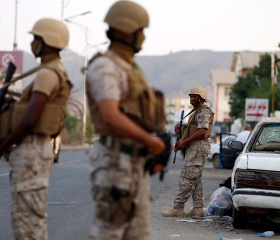Two and a half months after Russia and the United States announced a ceasefire in Syria the situation on the ground continues to be highly volatile. Despite a string of incidents that resulted in several hospitals in northwestern Syria being hit the talks appear to be ongoing, which is akin to a miracle given the scope of civilian casualties.
Two and a half months after Russia and the United States announced a ceasefire in Syria the situation on the ground continues to be highly volatile. Despite a string of incidents that resulted in several hospitals in northwestern Syria being hit the talks appear to be ongoing, which is akin to a miracle given the scope of civilian casualties.
Just like weeks ago Assad and opposition groups keep trading accusations blaming each other for violations of the truce and the lack of true commitment to peace talks. Despite the attempts of Moscow and Washington to keep the Geneva negotiations on track the key differences that divide the government and the opposition remain unresolved.
It seems that no progress whatsoever has been reached on Assad’s future in Syria, the stumbling block of any proximity talks that has been evident since the 2012 Geneva round of negotiations. While Russia and the US prefer to keep this issue on the back burner stressing the importance to end the hostilities first, Assad appears to have solidified his control over the government even further. Parliamentary elections that were held in Syria in mid-April demonstrated that despite rumors of a possible liberalization of the regime and inclusion of more opposition figures in the parliament, the Baath party continues to play a key political role. With the opposition and most Western governments dismissing the results as a sham these elections did not contribute to narrowing the gap between the opposing sides.
Russia and the US whose views on the Syrian peace process have considerably converged over the past months are rumored to be working on a new constitution for the country. A Russian diplomat who is familiar with the process has confirmed to the author that the process has been underway for quite some time now. The new constitution would aim at significantly limiting the powers of the Syrian president making Assad’s departure from power unnecessary since his role in the post-transitional period will be marginal.
Moscow and Washington are yet to sell the new constitution to Bashar Al Assad and the opposition but it will be a daunting task in part due to the fact that the political process proves hard to launch with Aleppo plunging into another round of violence. On May 5 Russia and the US agreed on a cessation of hostilities in Aleppo for 48 hours. However, rebels ignored the agreement and conducted a major offensive against government-controlled towns underpinning the limits of international negotiators’ control on the ground.
As a result of the offensive Iran suffered one of the largest single-day losses in Syria with IRGC losing 13 soldiers, having 18 more wounded and at least 6 captured by the rebels. According to the officials in Tehran Iranian soldiers were caught off guard by the rebels amidst the ceasefire that had announced in the area one day before that. Some in Tehran are losing their patience over Russia’s attempts to launch a political process that sees Moscow reduce its military involvement and leaves Iranians in the crosshairs. Officials in Iran are on the defensive trying not to demonstrate their frustration with the Kremlin’s actions in Syria and Aly Akbar Velayati, Ayatollah Ali Khamenei’s foreign policy advisor who is a frequent guest in Moscow, even had to reiterate it to Iranian reporters that Russia’s strategy is part of a plan known to Tehran.
Instability in Aleppo reveals that Assad’s control over the region is all but firm. Analysts forecasted that the government that had succeeded in isolating rebels around the city would eventually starve them out into surrendering. But some militant groups certainly feel empowered by recent attacks, particularly Jabhat Al Nusra. Given the fact that the outcome of events in Aleppo will decide the future of the Syria ceasefire in its entirety it is not surprising that this group is making attempts to derail the process.
With the Saudi-backed High Negotiations Committee having walked out of the Geneva talks attempts are still ongoing to have both sides of the conflict stick to the ceasefire. Jabhat Al Nusra that is not party to the agreement however is at liberty to exploit the obligations to cease fire that other militant groups have taken upon themselves. In that sense Nusra has benefitted from the cessation of hostilities and has demonstrated its military and political dominance over militias that are part of the deal, thus positioning itself as a go-to ally in the fight against Assad.
Jabhat Al-Nusra's increasing ambitions are highlighted in a recent statement by Al Qaeda leader Ayman Al-Zawahiri’s in which he calls on Muslims around the world to join the fight in Syria. More importantly the statement dispels rumors about a possible break-up between Al-Qaeda and its Syria affiliate. This is undoubtedly a positive development for powers fighting extremists since Jabhat Al-Nusra's label as AQ’s local branch serves as a certain watershed that to some extent helps divide moderates from jihadists. In this sense Zawahiri’s statement supports Russia’s position in questioning the commitment of some moderate rebel groups to the peace process if they coordinate their actions with Nusra.
With the cessation of hostilities and more recently “the regime of silence” now in place in Syria Jabhat Al-Nusra has become the only powerful militant group in the country’s northwest engaged in active fighting. This certainly resonates with individual fighters who do not necessarily share the opposition’s engagement in peace talks with Assad and makes them gravitate to the group that advocates jihad. Nusra’s popularity in Syria may see an unprecedented spike due to its successful offensives in Aleppo countryside where it managed to take over several towns controlled by the government-allied Shia militias despite Russia’s aerial campaign.
Jabhat Al Nusra’s growing popularity is also underpinned by the fact that it clashed with the Islamic State in the south of the country meaning that a rumored merger between the two groups is not in the cards at the moment. In fact the focus of the international community on fighting the Islamic State has allowed JAN to grow in strength and attract more fighters from abroad who think that “project IS” is now facing extermination.
While Russia and the US have continuously named Nusra and IS similar threats they seem to have failed to properly address the effects of the ceasefire in areas where JAN and pro-ceasefire militias operate next to each other. The plan to separate Nusra from other rebel groups has not succeeded so far, which is why John Kerry and Sergey Lavrov have announced their attempts aimed at isolating Jabhat Al Nusra and militias loyal to them from the rest of the opposition in an attempt to create a lasting mechanism allowing the cessation of hostilities to hold.
At the moment Nusra’s possible offensive south of Aleppo is the most likely reason why the ceasefire in Syria could fail. Al Qaeda’s own high-ranking Saif al-Adel as well as other senior figures have recently arrived in Syria indicating that having lost a number of commanders JAN is strengthening its ranks with experienced commanders capable of leading a major offensive. A resumption of hostilities led by Nusra will put other rebel groups under fire leaving them no other choice but to join the fighting backing one of the sides.
It seems that Russia and the US prefer to ignore the fact their plan for the cessation of hostilities led to the opposite in Aleppo. That is not to suggest that ceasefire cannot work there at all, it became clear however that security designs applied in areas where rebel groups are more homogenous cannot be applied in Aleppo where militias that signed the ceasefire agreement intermingle with those that didn’t.
International negotiators are determined to work out a mechanism to monitor and end violations in Syria. Such a procedure, however, may require significant international peacekeeping presence on the ground, which most countries have already ruled out. Russia and the US need to come up with a peace plan for Aleppo that is drastically different from security designs applied elsewhere in Syria, until then time works against them.






